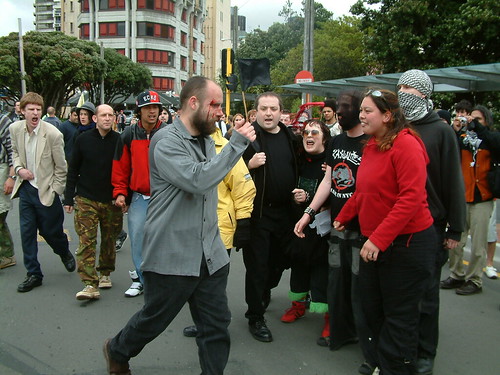I've been asked recently to comment on NZ First's latest stab at the Yellow Peril (the race, not the blog). My response? Give the man a hug. Not in a condescending sort of way, but seriously, give him – and all those whose alienation he's appealing to (and exploiting, to an extent) – a big hug.
If I sound like a hemp-wearing hippy, that can be attributed to my recent conversion to the Church of Obama. (Amen.)
What Brown said was pretty straightforward. He cites the StatsNZ Ethnic Population Projections, which show that the proportion of Asian New Zealanders are going to go from 10% in 2006 to 16% in 2026.
He drops in a quarter-century old red herring – that Asians will outnumber Maori, therefore dislocating them. This is a red herring because Asian New Zealanders are as Pakeha (and as much Her Majesty's subjects, if you will) as European New Zealanders. It doesn't matter that Asian New Zealanders are not related to the original signatories – or, more crudely, of the same stock as them. The Treaty's power comes via the lineage of the nation which it created, not the literal lineage of the people who signed it.
But that's just a sideshow. The main point that he makes is that Asians can't integrate into New Zealand, that Asians “will form their own mini-societies to the detriment of integration and that will lead to division, friction and resentment.”
NZ First first hawked this message in 1993, when I was 11 then. Times have change. A lot.
We see integration at the most fundamental levels. In schools, in workplaces, at the coffee shop, in the noodle bar. We chat, we hang out, we laugh, we play, we pray, we hook up, we breed. Race has not been a boundary for a long time.
We see this. But Peter Brown – and the people his message is directed at – don't. Brown is right that the face of New Zealand is changing. Of course it is. But even as many New Zealanders have grown more cosmopolitan, formed genuine connections with the once-mysterious Orient, taken in the breadth of cultures which have grown with – and into – each other, many others haven't. This change has not been as inclusive as it could've been.
Brown's is a voice of genuine alienation. (Even if his motivations were less than genuine, the alienation that he's trying to tap into is.) There are people in this country who don't understand the changes that are happening. It's a gap that comes with age, wealth, location and education as much as it's about simple outlook and open-mindedness. And if our goal is to build an inclusive multicultural society, it's not just us, it's them that we have to include.
My conversion to Obamaranity came at the very point when so many howled with outrage – when he talked about his grandmother in his speech on race:
I can no more disown [Reverend Wright] than I can my white grandmother – a woman who helped raise me, a woman who sacrificed again and again for me, a woman who loves me as much as she loves anything in this world, but a woman who once confessed her fear of black men who passed by her on the street, and who on more than one occasion has uttered racial or ethnic stereotypes that made me cringe.
“These people are a part of me. And they are a part of America, this country that I love.”
It was the antithesis to the politics of shame which characterises racial politics: to call people racist, and to demand that they feel ashamed of themselves. He was unashamed of the parts of her which can be described as racist. He was unashamed of her. It wasn't just an open embrace, but also open eyes – he was acknowledging the racial tensions that exist, as manifested in Reverend Wright's sermons, as manifested in his grandmother. It's real, it's there, it's part of society as it is now, but it doesn't have to be part of the future.
It was a recognition that these dynamics are complex – more complex than “right vs wrong” – and that ultimately, it's the embrace, not the rebuke, that will break down those barriers.
My own experience of this came in 2004, when the National Front marched on Parliament. When the National Front were on their way out, the assorted anarchists and punks chased them near the Law School, whereupon fearless leader Kyle Chapman and others jumped into their cars and drove off.
One National Front member, Cale Olsen, was left behind. A quick scuffle ensued, Cale got smacked and was left alone and bleeding, surrounded by a angry, jeering crowd. They chased and hounded him down the street. The look on their faces said it all.
I felt myself wanting to help him. I still remember thinking how powerful, how utterly life-changing a helping hand would have been, and how all that venom and bile changed nothing. I missed my chance, and remained on the sidelines. Cale was there, once again, in 2006.
